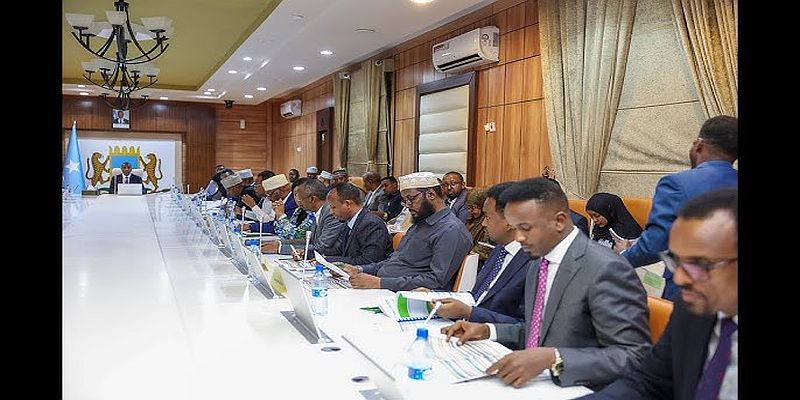Somalia Moots A $1.34 Billion Budget for FY2025 And International Borrowing

The Somali cabinet has approved a budget of $1.34 billion for the Federal Government for 2025, representing a 24.4% increase from the previous year’s allocation of $1.079 billion. This increase is attributed to rising domestic revenue and the necessity to address recurring expenditures, with projected domestic revenue set at $429.4 million—up 24% from $346.2 million in 2024.
In comparison, the budgets for East African Community (EAC) countries for 2025 are as follows:
- Kenya: $31.9 billion (3.1% increase from 2024/25)
- Uganda: $19.61 billion (36% increase)
- Tanzania: $18.85 billion (11.2% increase)
- Rwanda: $4.63 billion (11.2% increase)
- South Sudan: $1.4 billion
- Somalia: $1.34 billion (24.4% increase)
Somalia's budget reflects the second highest increase among EAC countries, following Uganda's 36% increase. This demonstrates the government's commitment to enhancing operational costs, particularly to cover escalating security expenses. The budget-to-GDP ratio exceeds 12%, indicating the growing influence of the government in the economy.
The Somali government plans to finance the budget through $429.4 million in domestic revenue for 2025. The breakdown (Source: MoF, Somalia) is as follows:
2025 Forecast (In Millions, USD)
Domestic Revenue 423.5*
Tax Revenue 295.3
Income Tax 38
Sales Tax 50.6
Customs 186.2
Other Taxes 20.4
Non-Tax Revenue 128.2
*Note: The approved budget by the council of ministries indicates $429.5 million in domestic revenue, but the government has yet to release the information publicly. The figures above are derived from the Somali Medium Term Revenue Roadmap 2024-2027.
The income tax is expected to grow nearly 38% compared to the 2024 budget, as the government has proposed a new tax bill with significant implications for corporations. The corporate income tax (CIT) has been reduced from 30% to 15%, which is expected to enhance compliance from corporations that previously found the former rate financially unfeasible given the challenging business environment. Additionally, the personal income tax (PIT) is anticipated to generate further revenue as its scope has been broadened, now applying to lower-income earners with a taxable income threshold starting at $100 instead of the previous $200.
Sales tax is projected to contribute approximately $50.6 million for FY2025, facilitated by a 5% rate across all sectors, particularly merchants utilizing digital payment systems. Although the legal basis for the sales tax is derived from the 1984 Sales Tax Law No. 2, it is imperative for the government to modernize this framework by passing updated sales tax legislation through parliament.
The government also expects to borrow $35.6 million from international financial institutions. The Ministry of Finance needs to provide more details regarding this borrowing, including repayment plans and cash flow sources. With approximately $600 million in outstanding debt to external lenders, Somalia must exercise caution regarding any additional domestic or external borrowing to avoid returning to a state of high debt stress following post-HIPC (Heavily Indebted Poor Countries Initiative).
Moreover, approximately $870 million in 2025 is anticipated from international grants and development aid, compared to $694.6 million in 2024, highlighting a significant and growing reliance on external assistance. Major expenditures will focus on salaries and the procurement of goods and services.
The Federal Government of Somalia's proposed budget for 2025 allocates $610 million for recurring expenditures and $713 million for development, compared to $569 million and $509 million in 2024, respectively. This reflects an increase of $41 million in recurring expenditures and $222 million in development expenditures. These funds are expected to support administration, defense and security, economic services, and social services.
By Hussein Abdullahi Yusuf
Consultant, economist and financial sector analyst in Eastern Africa.
Email: xuseenmt@outlook.com
Courtesy: Hiiraan
